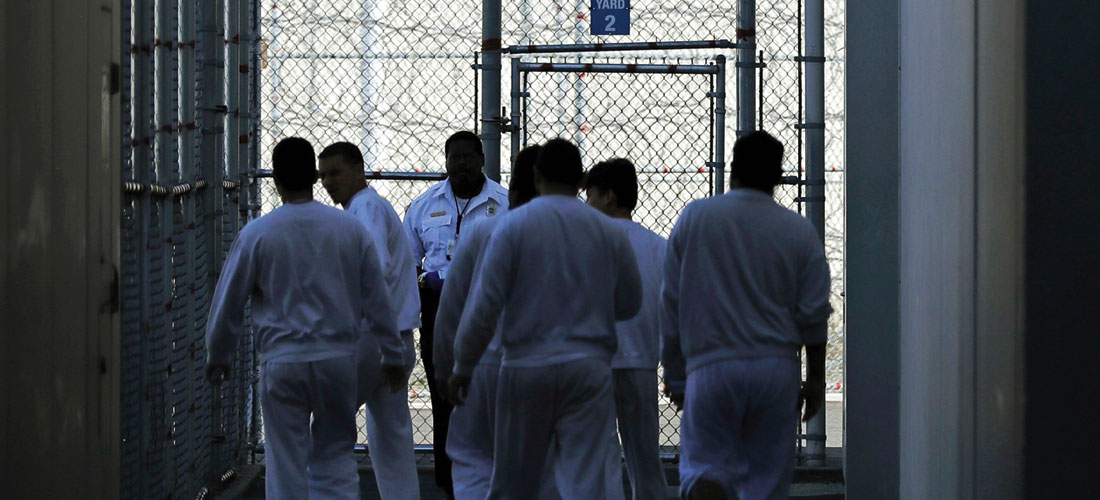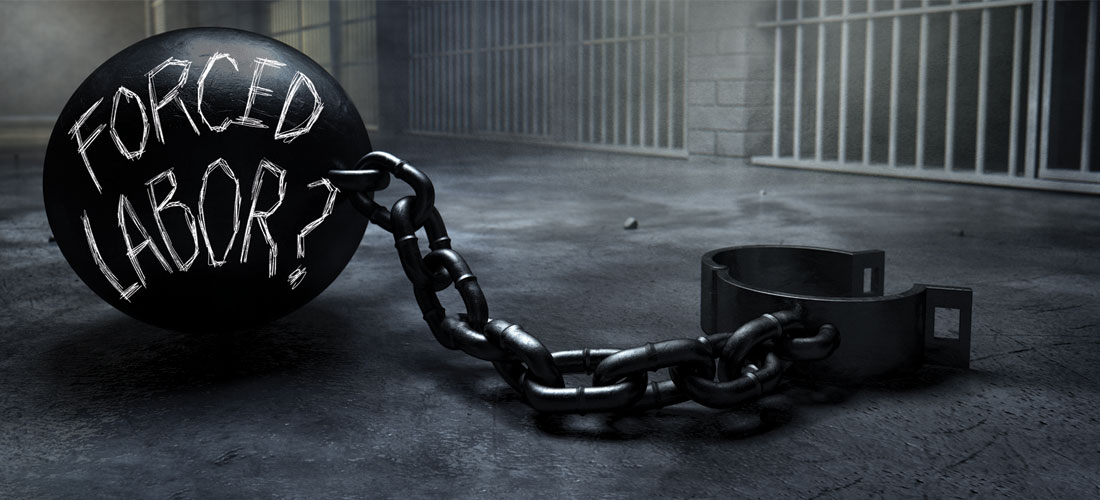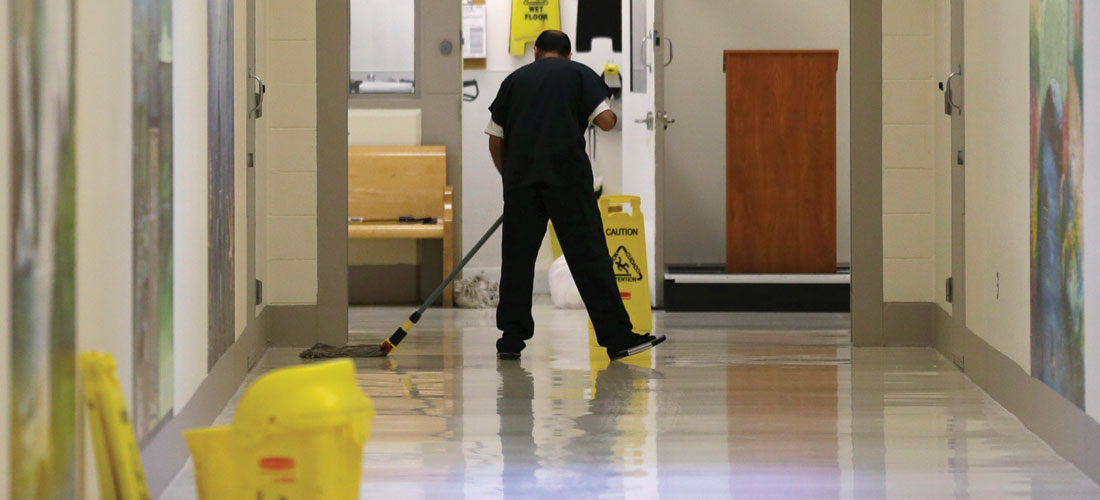
When Goodluck Nwauzor arrived at the U.S. southern border in May 2016, he hoped his nightmare was over and that the American dream was within reach. Nwauzor, formerly a small business owner in Nigeria, became a target of the violent militant group Boko Haram. When they burned his business and home to the ground, he fled and traveled for six months through South and Central America before arriving at the U.S. border.
“I said I would like to have asylum,” Nwauzor would later testify in court. “I believe my life will be safe if I find myself in America.”
Instead, he was detained in a center in Tacoma, Washington. It was there he found himself cleaning showers for the 50-60 other migrants in his pod seven days a week, earning only $1 a day.
“I need the money desperately,” Nwauzor explained. “I have no choice. I have to do it so I can get the money and do my paperwork.”
After 13 months at the Northwest Detention Center, Nwauzor was granted asylum. But his journey didn’t end there—Nwauzor became the named plaintiff in a groundbreaking class action lawsuit against the GEO Group, one of the biggest private prison contractors in the country. In that case, a federal jury awarded $17.3 million to 10,000 detainees who were compelled to work for less than minimum wage. In a related lawsuit filed by the state of Washington, the judge also ordered GEO, which operates dozens of detention centers across the U.S., to pay an additional $5.9 million to the state for unjust enrichment.
For decades, activists have been challenging what has become a widespread policy of paying little to nothing for work done by immigrant detainees. The October 2021 verdict in Nwauzor v. the GEO Group has been hailed as not just a success story but also a potential game changer for a practice advocates say violates civil rights.
In addition to the back pay GEO must pay detainees, the charge of unjust enrichment may significantly alter the landscape of immigrant detention in the United States.
“If we continue to go after these labor practices, we can potentially end the private detention system because it won’t be profitable for these companies to get into the business,” says Anita Sinha, associate professor of law and the director of the International Human Rights Law Clinic at American University Washington College of Law.

The Tacoma case is just one in a wave of lawsuits nationwide challenging the policy of paying immigrant detainees $1 a day, allowing the private companies who run detention centers to reap huge profits.
“I hope that this will contribute to the success of those other cases,” says Adam Berger, an attorney with Seattle-based Schroeter Goldmark & Bender and the plaintiffs’ lead counsel in Nwauzor v. GEO. Berger points out that the decision came from “a unanimous jury of ordinary people, opening the door to possibilities that this [policy] will be seen in a different light.”
Under the Immigration and Customs Enforcement’s Voluntary Work Program, detainees were paid an allowance for work performed at a rate set by Congress in 1950 and codified in the 1978 Appropriation Act. Under the act, Congress appropriated $1 per day for work that would be done by civil detainees who may be in the country illegally but have not necessarily committed a crime; many are waiting on asylum claims. Civil detainees were afforded a different standard than people in custody for the purposes of punishment, who are exempt under the Fair Labor Standards Act.
The Nwauzor case is on appeal, but immigration activists hope it might turn the tide for a number of similar cases documenting labor abuse in detention centers. Two earlier complaints about forced labor failed in the New Orleans-based 5th U.S. Circuit Court of Appeals. In 1990, a judge ruled that the detainees were not protected under the FLSA; and in 1997, the court held that the work was “a communal contribution” and not in violation of the 13th Amendment’s prohibition of involuntary servitude.
In Nwauzor, plaintiffs argued that the detainee workers were employees of GEO because “they were doing the bulk of the labor needed to keep the facility running. Under the Washington state Minimum Wage Act, that made them employees, and they were entitled to minimum wage rather than $1 a day,” according to Berger.
Jacqueline Stevens is a professor of political science at Northwestern University and the founding director of the Deportation Research Clinic at Northwestern’s Buffet Institute for Global Affairs. The clinic maintains a database that tracks the misconduct of federal, state and local agencies implementing deportation laws.
In 2009, Stevens was investigating a series of cases involving the unlawful detention and deportation of U.S. citizens. While driving to the Stewart Detention Center in Lumpkin, Georgia, to investigate a case in which a U.S. citizen had been deported to Mexico, she was asked by the individual in question if she could try to collect the $32 owed to him for buffing floors while he was detained.
“I thought to myself, he’s a U.S. citizen, and this corporation is paying him $1 a day to buff the floors? I knew that this was legal for criminal prison, but this was civil detention,” Stevens says. The revelation led Stevens to pursue a series of Freedom of Information Act requests to uncover the nature of the program and whether it was legal to pay less than minimum wage to those not charged with a crime.
Because detention centers fall under the purview of immigration law, the issue seemed murky at first. “The courts have ruled that immigration law affords lower due process protections when it comes to deportation and different presumptions for so-called aliens, so those claims are generally treated with a lower layer of scrutiny,” says Stevens, whose focus at the time was U.S. citizens who were being detained or deported. “U.S. citizens can’t be treated that way, and eventually it became clear to me that as a labor issue, this might not be kosher.”
In her investigation, Stevens discovered that Congress stopped appropriating funds for civil detainee labor in 1979 without explanation; however, the Immigration and Naturalization Service, a precursor of ICE, continued with the $1-a-day policy in detention centers.

One of the class members represented by Berger is a 43-year-old detainee who worked at the Tacoma detention center between 2017 and 2020 and described the experience as a “nightmare.” According to Berger, the detainee—who asked not to be named—fled to the U.S. in 1990 with his mother at age 12 after they were kidnapped by a drug cartel. ICE picked him up in 2017 and sent him to the Tacoma detention center. He worked in various capacities at the Northwest Detention Center during the time he was there.
When the security guard asked him if he wanted to work, the detainee jumped at the chance, Berger says. “He said he wanted to do something, but at the time he didn’t know the work would be so hard.” In the three years he spent at NDC, he cleaned the showers and his section’s living quarters and occasionally did touch-up painting around the facilities. Whether the work was one hour or four, the pay was the same. He was once asked to clean the visitation areas where the attorneys and families meet.
“It took him four days, working probably three to four hours each day, to wax the floors,” Berger recounts. “His reward for that exhausting work was $2.”
At one point, his client was given the opportunity to work in food preparation, a plum assignment because detainees were often given extra rations. When he fell ill one morning, he says he was awakened by a forceful “slap” on the back and ordered to work. When he told the guards he was sick, he was sent to work anyway.
According to Berger, the detainee filed a complaint, pointing out the physical violence was caught on camera. “As a result, he was promptly taken off kitchen duties and sent back to cleaning showers. He was also moved to another living area while the offending officer remained untouched.” His asylum case is still pending.
While Nwauzor focused on the use of migrant labor and refusal to pay minimum wage, some other cases are claiming the practice violates the Trafficking Victims Protection Act. Since 2000, changes to the TVPA combatting human trafficking broadened the definition of coercion. This led to changing legal strategies focusing on the TVPA in addition to unfair labor practices and unjust enrichment. “Previously, challenging the terms and conditions of prison labor under the 13th Amendment was generally unsuccessful,” Sinha says. “However, changes in the TVPA have made what constitutes trafficking more clear.” Included in this is the word “coercion,” which is proving to be a game changer in recent cases.
While complaints about coerced voluntary work programs have focused largely on private contractors, a lawsuit was filed in April against an Illinois county and sheriff, alleging they instituted a forced labor program without compensating detainees. Plaintiffs are pursuing class action status for former detainees of the McHenry County Adult Correctional Facility in a suit seeking $5 million in damages for those forced to work “without compensation and against their will,” according to the lawsuit. Illinois ended the policy of detaining immigrants in local jails earlier this year.
The TVPA was strengthened in 2003 to allow victims to hold their traffickers accountable. In 2008, partially in response to a U.S. Supreme Court ruling that narrowly defined forced labor, the TVPA was amended again. The amended Section 1589 allowed for more subtle forms of coercion, and unlike the FLSA, it does not provide exemptions for government contractors or prisons.
In many of the pending cases, detainees say they were coerced into working or were threatened with discipline or even solitary confinement if they complained or refused to work. While GEO and CoreCivic, another one of the largest private prison contractors, say their programs are voluntary, a number of other class action lawsuits allege that detainees are coerced into working under threat of punishment, violating the TVPA.
Sofia Casini is the director of visitation advocacy strategies at Freedom for Immigrants, an organization that advocates for the end of immigration detention. While working as visitation coordinator of Grassroots Leadership, supporting women detained inside the CoreCivic-operated T. Don Hutto Residential Center in Texas from 2016 to 2019, she was made aware of “exploitation and abuse related to the voluntary work program” in the center.
“It took many months of building trust for women to share what they were experiencing,” says Casini, who points out that many in the women-only center are asylum-seekers who have already experienced deep trauma.
According to Casini, a 19-year-old woman from Mexico reported she hadn’t been paid in two months because of a “technical glitch” in the commissary system. “The real-life impact was that she went two months without having any money on her commissary account and was eventually deported without ever receiving her wages.”
Others claim that guards threaten to write up poor character reports if they refuse to work, and these reports allegedly would be included in their immigration files to be reviewed by the asylum judge in determining whether the women could stay in the country.
“This threat was repeated when women spoke out about any form of abuse, including solitary confinement, medical and sexual assault,” Casini says. “For anyone who has escaped their country to save their own life, this threat of a ‘bad character report’ being the deal breaker in whether or not they’re granted asylum seems incredibly risky. Many would rather endure whatever they face.”

The successful litigation of Nwauzor v. GEO may be a harbinger of things to come in other complaints against GEO and CoreCivic. According to the Human Trafficking Legal Center, at least 17 cases against prison companies, municipalities and detention facilities, among others, have been filed in federal court on anti-trafficking charges, involuntary servitude and forced labor laws. At least six of them address immigrant detention centers.
Both GEO and CoreCivic say they are simply contractors following ICE guidelines that allow for compensation of $1 per day.
But as Andrew Free, co-counsel in Nwauzor, points out, “As a matter of law, Congress stripped the federal government of its ability to set the rate and to pay it, but it didn’t strip the contractors of their duty to compensate people for work performed under state law, and the court has now recognized that repeatedly.”
In the most recent development, the Deportation Research Clinic obtained a letter from ICE to GEO through a Freedom of Information Act request demonstrating that GEO was aware of its obligations to pay minimum wage. In the letter, dated June 18, 2018, ICE denied GEO’s request for further compensation for labor costs, stating specifically that while the reimbursement rate for labor was $1 per day, it was up to GEO to “ensure compliance with all applicable federal, state and local work safety laws and regulations.”
Other recent rulings have broken the pattern of past decisions holding that the defendants were exempt as federal contractors, minimum wage laws do not apply in detention centers, and the prisons were following ICE guidelines. A 2020 decision by the Atlanta-based 11th U.S. Circuit Court of Appeals, Barrientos v. CoreCivic Inc., held that the TVPA does in fact apply to federal contractors operating federal detention facilities.
But in a case filed in 2014 by detainees at the Aurora Contract Detention Facility, which houses over 1,500 people, the U.S. District Court of Colorado ruled that GEO was not an employer akin to a private business. Still, Nwauzor’s case against GEO went in a different direction.
“We were able to prove that GEO called all the shots, and they decided who would work where and otherwise—they had all of the hallmarks of an employment relationship,” Berger says. Indeed, in at least two other cases, a federal judge denied a motion to dismiss based on these grounds.
Now with a landmark jury trial victory in Washington and split decisions in other circuits, court watchers speculate the forced labor question may go all the way to the Supreme Court. In the meantime, the decision in the Tacoma case may put further pressure on President Joe Biden’s administration to halt the privatization of the detention system.
Critics of voluntary labor programs say the issue goes beyond prison walls. Many detention centers and prisons are built in rural communities and come with the promise of jobs and other economic benefits.
“The myth of prosperity and jobs is something that needs to be exposed,” says Azadeh Shahshahani, an Atlanta-based attorney and co-counsel in a class action suit against CoreCivic at the Stewart Detention Center in Georgia. In 2017, Stewart County was singled out by a U.S. Census Bureau report as one of the poorest counties in the nation.

Currently, ICE contracts approximately 70% of its facilities to private operators GEO and CoreCivic. Since private companies are beholden to shareholders looking to maximize profits, the potential for exploitation is higher than if facilities were government-run, critics say.
The increase in the number of detention centers run by private corporations dovetails with policies and legislation criminalizing immigration. Increasing the numbers of immigrants detained has meant profitable contracts for private prison companies like GEO and CoreCivic. According to the American Civil Liberties Union, around 28% of GEO’s and CoreCivic’s revenue came from ICE detention contracts in both 2019 and 2020. In 2021, GEO Group had $2.26 billion in revenue while CoreCivic, which runs 113 facilities, had $1.86 billion.
The biggest cost by far is labor, which means that if private prison companies were forced to pay minimum wage, they’d likely abandon the detention business as unprofitable, Sinha says.
In a statement released to the press, GEO said they “strongly disagree” with the jury’s verdict in Nwauzor and believe their claims were wrongfully dismissed. GEO is appealing the ruling to the San Francisco-based 9th U.S. Circuit Court of Appeals, which halted litigation in Novoa v. GEO Group, a case in Adelanto, California, in which detainees allege the contractor violated California’s minimum wage and unfair competition laws, the TVPA and unjust enrichment. After the Nwauzor verdict, the judge issued a stay in Novoa pending a decision on the company’s appeal. The case is expected to be heard in October.
In all of these cases, activists say their end goal is to stop the exploitation of migrants by demanding minimum wage and to end the private detention system altogether.
“All of the evidence points to the forced nature of this program, and this exploitation needs to end,” Shahshahani says. “We do hope to build on this momentum to get private prison corporations out of the business of incarcerating human beings and making money off of human pain.”